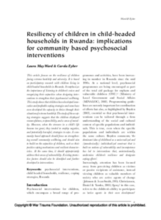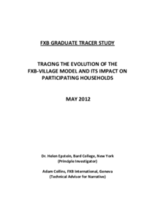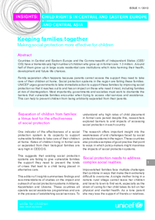Displaying 431 - 440 of 525
Based on participatory research with children living in child headed households in Rwanda, this article focuses on the resilience of children facing extreme hardship and adversity. While the research focuses on child headed households, this study’s findings can be considered more broadly for interventions for other vulnerable children to support their development of innovative coping strategies.
This International Labour Organization (ILO) brief introduces a new international standard adopted in June 2012, the Social Protection Floors Recommendation, 2012 (No. 202), that provides guidance to member States in building comprehensive social security systems and extending social security coverage by prioritizing the establishment of national floors of social protection accessible to all in need.
This International Labour Organization (ILO) document introduces a new international standard adopted in June 2012, the Social Protection Floors Recommendation, 2012 (No. 202), that provides guidance to member States in building comprehensive social security systems and extending social security coverage by prioritizing the establishment of national floors of social protection accessible to all in need.
Study tracing impact of FXB International's community-driven “FXB-Village” model on graduates of the program. The models is a structured program of household support and economic strengthening designed to empower particularly vulnerable families to escape extreme poverty and ensure the enduring wellbeing of the children in their care.
This comprehensive policy report by the Annie E. Casey Foundation summarizes what is known about kinship care in the United States, identifies the problems and issues these families face, and recommends how best to support caregivers as they step up to take responsibility for children in their extended families and communities.
The National Family Preservation Network (NFPN) recently released its family assessment tool designed for use in Least Developed Countries (LDC). The tool aims to help a variety of workers serving families in least developed countries by providing methods and approaches to enhance family strengthening.
This paper presents new estimates of the average lifetime cost per child maltreatment (CM) victim in the United States and aggregate lifetime costs for all new cases of CM incurred in 2008 using an incidence-based approach. The authors find that the lifetime economic burden of CM is approximately $124 billion. Given this substantial economic burden, the authors argue that the benefits of prevention will likely outweigh the costs for effective programs.
The CCS Guidelines is the “how-to” guide for instructing health and psychosocial field staff responding to children who have experienced sexual abuse in humanitarian settings.
This edition of Insights produced by UNICEF summarizes the findings and recommendations of studies on the impact and outreach of social protection systems in Albania, Kazakhstan, and Ukraine where high rates of child placement in formal care still persist. The research offers important insight into the weaknesses and challenges faced by social protection systems in the region, but also point to ways in which policy-makers might maximise the impact of social protection systems in order to ‘keep families together’.
This paper explores the research evidence from England and France on the mental health of young people aging out of care and into adulthood.







